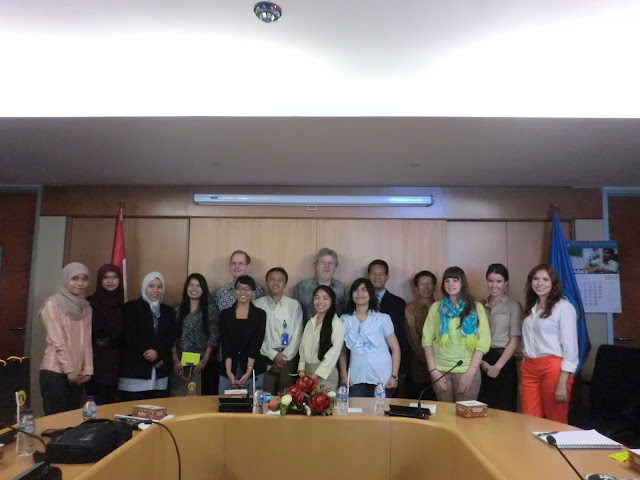USIPP #3: Big Players in Religious Pluralism
Today
we have pretty tight schedule. We visited some official offices such as the
Ministry of Higher Education (DIKTI), Forum for Interfaith Discussion (Forum
Kerukunan Umat Beragama-FKUB), Nahdlatul Ulama (NU), and the last but not least
one was Muhammadiyah.
The
first visitation was to DIKTI where Mr. Purwanto, the Secretary of DIKTI
welcomed us and kindly explained about the roles of DIKTI in order to ensure
the achievement of the quality standard of higher education in all over
Indonesia. Furthermore, to internationalize (to make the world acknowledge
Indonesian’s univerties or education). they have several programs like a joint
program with USA which called DIKTI Fullbright Scholarship Program, Sandwich
Program which offers academic staff to experience student exchange program for
4 months), and SAMI (Academic Mobility) for PhD to visit overseas universities
or to conduct a joint research.
Next,
we went to FKUB and were warmly welcomed by several figures from each different
religion in Indonesia. FKUB has 21 members from 6 religions, they are: Islam,
Christianity, Protestant, Budhism, Hindu, Kong Hu Chu. FKUB exerts 5 main tasks
as stated below:
1.
Conduct the interfaith
dialog.
2.
Welcome aspirations from
people of Indonesia.
3.
Deliver the aspiration to
the government.
4.
Socialization of policies
in regard to religion.
5.
Recommend the worship place
(rumah ibadah).
The
different that FKUB felt in regard to the New Order Era and today is that in
the New Order, you had top-down approach. According to FKUB, what was happening
in Indonesia regarding chaotic situation which involved religion actually isn’t
merely because of different religions we have. There are some parties who stir
the situation to gain political power or personal interest.
The discussion
in FKUB was very lively and enlightening. Not only the USIPP’s participants but
also the FKUB members themselves benefited from the discussion. They were
pretty excited to ask what is going with the Moslem population in United
States, how the US government protect each individualto practising their
beliefs, or how the US perceptions regarding religious pluralism in Indonesia,
and so on. The discussion improved our (both side) understandings about each
other perceptions and clarifying things in regard to religious pluralism in US
and Indonesia. This is vital because US is a significant player in the world
including the one who play a role in Palestine which is a very sensitive issue
for Islamic-populated country such as Indonesia.
In
NU, we have Prof. Zaki Mubarak as the spekaer along with other 2 or 3 persons.
NU is the oldest and the biggest Islamic organization in Indonesia which
embracing the local cultures in preaching Islamic teachings. They believe that
their position is in between the hardliner and the liberalist. According to
them, the hardliner uses only “hard verses” and leaves the soft one. Meanwhile
the liberalist is quite the opposite. Thus NU try to redirect them by providing
a complete verses in Al-qur’an along with As-Sunah and Ijtihad in order to give
a comprehensive understanding.
NU’s
preaching methods is actually similar with Wali Songo’s (9 Saints) in Central
Java’s coastal areas. They proclaimed that even (believe it or not) the
founding fathers and the leader of NU itself was decendants from Wali Songo.
This is interesting because there was a long debate in matter of whether Wali
Songo are Chinese. However, the politic condition in that time, make it impossible
to acknowledged the truth. In that time, there was a discrimination related to
Chinese especially in Soeharto Era. That explains why almost all Chinese in
Indonesia have their Indonesian’s name beside their Chinese one. Interestingly,
if the claim of NU’s members is true (that their leaders are decendant from
Wali Songo), then it may be true that Wali Songo is the Chinese decendant
because as we know, the former Presdident Abdurrahman Wahid was the leader of
NU and he was Chinese. Well, it still needs to be clarify with the historical
evidents though.
The
last destination was Muhammadiyah. Muhammadiyah is the second largest Islamic
organization in Indonesia based on the amount of members. The provide four
major services to the community such as:
1.
Education: Muhammadiyah
currently operated more than 14.000 schools and higher education institutions
in all over Indonesia ranging from elementary schools to universities. In some
places such as Palangkaraya and Nusa Tenggara, more than 70% of their students
are non-moslem students. For those students, they provide them with religion
study based on their own religion. This is proven that Muhammadiyah embraces
differences in religions and tolerant toward others.
2.
Health services by building
hospitals and clinics in alll over Indonesia.
3.
Economic empowerment
through microfinancing, including bank.
4.
Disaster management and
rescue.
You
must be wondering how they generate the
money to conduct all of their agendas which requires a huge funding. Generally,
they have 3 main sources of fund as below:
1.
Member’s donation
2.
Partnership with other Non
or Islamic organizations.
3.
Profit from the schools,
universities, institutes, and hospitals.
Responding
on Ahmadiyah issue, Muhammadiyah said that actually Muhammadiyah’s leader has a
strong relationship with Ahmad Ghulam who later become the leader of Ahmadiyah.
There was also a hospital in West Java owned by Ahmadiyah which only want to be
sold to Muhammadiyah. I just found out that in 1932, Muhammadiyah has issued a
Fatwa stated that Ahmadiyah is not Islam but they FORBID ummah to conducted any violantion to Ahmadiyah and encouraged a
peace dialog with Ahmadiyah.


Comments
Post a Comment